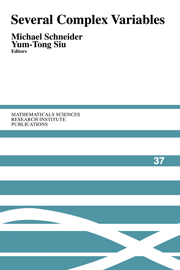Book contents
- Frontmatter
- Contents
- Preface
- Local Holomorphic Equivalence of Real Analytic Submanifolds in ℂN
- How to Use the Cycle Space in Complex Geometry
- Resolution of Singularities
- Global Regularity of the ∂-Neumann Problem: A Survey of the L2-Sobolev Theory
- Recent Developments in the Classification Theory of Compact Kahler Manifolds
- Remarks on Global Irregularity in the ∂-Neumann Problem
- Subelliptic Estimates and Finite Type
- Pseudoconvex-Concave Duality and Regularization of Currents
- Complex Dynamics in Higher Dimension
- Attractors in ℙ2
- Analytic Hilbert Quotients
- Varieties of Minimal Rational Tangents on Uniruled Projective Manifolds
- Recent Developments in Seiberg-Witten Theory and Complex Geometry
- Recent Techniques in Hyperbolicity Problems
- Rigidity Theorems in Kahler Geometry and Fundamental Groups of Varieties
- Nevanlinna Theory and Diophantine Approximation
Remarks on Global Irregularity in the ∂-Neumann Problem
Published online by Cambridge University Press: 25 June 2025
- Frontmatter
- Contents
- Preface
- Local Holomorphic Equivalence of Real Analytic Submanifolds in ℂN
- How to Use the Cycle Space in Complex Geometry
- Resolution of Singularities
- Global Regularity of the ∂-Neumann Problem: A Survey of the L2-Sobolev Theory
- Recent Developments in the Classification Theory of Compact Kahler Manifolds
- Remarks on Global Irregularity in the ∂-Neumann Problem
- Subelliptic Estimates and Finite Type
- Pseudoconvex-Concave Duality and Regularization of Currents
- Complex Dynamics in Higher Dimension
- Attractors in ℙ2
- Analytic Hilbert Quotients
- Varieties of Minimal Rational Tangents on Uniruled Projective Manifolds
- Recent Developments in Seiberg-Witten Theory and Complex Geometry
- Recent Techniques in Hyperbolicity Problems
- Rigidity Theorems in Kahler Geometry and Fundamental Groups of Varieties
- Nevanlinna Theory and Diophantine Approximation
Summary
The Bergman projection on a general bounded, smooth pseudoconvex domain in two complex variables need not be globally regular, that is, need not preserve the class of all functions that are smooth up to the boundary. In this article the construction of the worm domains is reviewed, with emphasis on those features relevant to their role as counterexamples to global regularity. Prior results, and related issues such as the commutation method and compactness estimates, are discussed. A model in two real variables for global irregularity is discussed in detail. Related work on real analytic regularity, both local and global, is summarized. Several open questions are posed.
There were antecedents. Barrett [1984] gave an example of a smoothly bounded, nonpseudoconvex domain for which the Bergman projection B fails to preserve C∞ (Ω) Kiselman [1991] showed that B fails to preserve C∞ (Ω) for certain bounded but nonsmooth pseudoconvex Hartogs domains. Barrett [1992] added a fundamental insight and deduced that for the so-called worm domains, which are smoothly bounded and pseudoconvex, B fails to map the Sobolev space Hs to itself, for large s. Finally Christ [1996b] proved an a priori Hs estimate for smooth solutions on worm domains, and observed that this estimate would contradict Barrett's result if global C∞ regularity were valid.
This article discusses background, related results, the proof of global irregularity, and open questions. It is an expanded version of lectures given at MSRI in the Fall of 1995. A brief report on analytic hypoellipticity is also included. I am indebted to Emil Sträube for useful comments on a preliminary draft.
Information
- Type
- Chapter
- Information
- Several Complex Variables , pp. 161 - 198Publisher: Cambridge University PressPrint publication year: 2000
